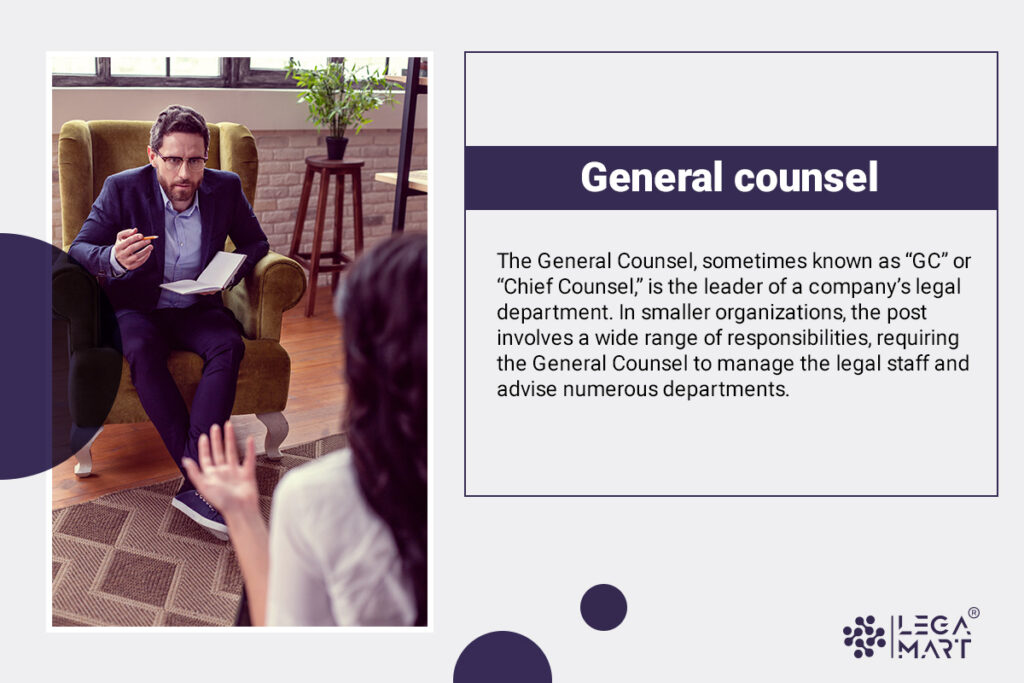Introduction
In the world of corporate governance, the Chief Counsel or General Counsel is the most important legal person, acting as the chief attorney and legal counsel to both the board and shareholders. While the reporting line often runs directly to the CEO, the General Counsel’s primary role is to protect the company’s interests and shield it from operational legal concerns.
Due to the ever-changing character of the contemporary business environment, the General Counsel’s responsibilities have significantly broadened from their former legal-centric focus. In addition to its traditional function as a legal stalwart, the modern General Counsel now assumes a multifaceted role that effectively integrates legal expertise, business acumen, and strategic foresight. General Counsels now occupy pivotal roles in firm leadership and corporate decision-making as a result of this transition.
In addition to his or her legal responsibilities, the contemporary general counsel functions as a crucial business manager and an integral member of the senior management team. This article shall delineate the constituent parts and routine obligations of a general counsel.
Defining the General Counsel
The General Counsel, sometimes known as “GC” or “Chief Counsel,” is the leader of a company’s legal department. In smaller organizations, the post involves a wide range of responsibilities, requiring the General Counsel to manage the legal staff and advise numerous departments.
In bigger organizations, the legal department may have numerous layers, including responsibilities such as in-house counsel, deputy general counsel, and vice president legal. In this situation, the General Counsel takes on supervisory and leadership responsibilities, controlling the whole department and reporting directly to the CEO and board.
Difference between In-House Counsel and General Counsel

There is a general overlap between In-house counsel and general counsel. However, both the terms have different meanings.
In-house counsel
- In-house counsel is a wide phrase for attorneys who work inside a corporation. These legal specialists are hired by the organization to manage a variety of legal issues.
- As paid full-time workers, they do not typically charge a retainer or hourly cost for each legal assignment.
- While in-house lawyers are skilled at managing day-to-day operations and regular business concerns, they may lack the necessary experience for every legal decision.
- While in-house counsel handles ordinary concerns, circumstances that need specialized expertise or external representation may necessitate the assistance of an outside general counsel.
General Counsel
- The General Counsel is often the highest-ranking in-house lawyer within a legal department, serving as a C-suite executive.
- This person often occupies a C-level executive role, such as Chief Operating Officer (COO) or Chief Financial Officer (CFO).
- Companies speak with their General Counsel before making critical commercial or legal decisions. They give specialized opinions on both legal and commercial matters.
Chief Legal Officer vs. General Counsel
Following are some differences between the roles and their respective responsibilities –
Chief Legal Officer (CLO)
- Position and Oversight:
The Chief Legal Officer (CLO) occupies a crucial role within the executive team, contributing to the high-level oversight of the legal department. This position emphasizes a strategic perspective, focusing on the broader organizational goals and long-term planning.
- Reporting Structure:
Typically reporting directly to the CEO, the CLO establishes a direct line of communication with top leadership. Engaging in collaborative efforts with other C-suite executives, the CLO actively participates in the development of comprehensive business strategies.
- Corporate Strategy:
The CLO takes a lead role in developing and shaping the corporate strategy. This includes prioritizing the safeguarding of intellectual property and assets while anticipating and managing risks associated with the company’s growth, mergers, acquisitions, and regulatory compliance. The CLO proactively identifies potential issues before they escalate into legal risks. This role serves as a guardian of corporate ethics and plays a critical advisory role in the boardroom.
General Counsel (GC)
- Legal Team Management:
Assuming a leadership role, the General Counsel (GC) heads and manages the day-to-day operations of the legal team. This involves more hands-on management, making immediate decisions on legal matters such as compliance, contract review, asset protection, and litigation.
- Regulatory Compliance and Risk Management:
The GC manages and mitigates risks for the organization, emphasizing regulatory compliance. Specializing in areas such as safety regulations, accessibility laws, and data privacy regulations, the GC plays a critical role in ensuring business success.
- Immediate Decision-Making:
The legal team looks to the GC for immediate guidance on legal issues that require prompt resolution. The GC efficiently handles routine legal matters to ensure smooth day-to-day operations.
- Efficient Management:
The GC efficiently manages administrative tasks within the legal department. Utilizing data-driven insights and tools for tracking and reporting, the GC ensures streamlined legal processes
What are the qualifications and skills required to become General Counsel?

General Counsels often have legal credentials, such as passing the state bar exam. Furthermore, they may have additional qualifications such as the Multistate Bar Examination (MBE) and specialized credentials relevant to the company’s business sector. However, there are a few more sets of requirements for such posts. Hence, To begin the route to becoming a General Counsel, prospective candidates must have the following requirements –
Educational and Professional Qualification
Aspiring candidates must have a bachelor’s degree in law, or alternatively, candidates with a non-legal background must have a law conversion programme to meet the educational requirements.
Following that, to become a completely qualified lawyer, candidates have to adhere to the Solicitors Regulation Authority’s regulatory standards. This sometimes entails finishing the Legal Practice Course (LPC) and acquiring a practical experience visa mandatory training contract.
Skill Development and Expertise Building
Continuous skill and competence development is an important component of preparing for a post as General Counsel. Taking the Professional abilities Course (PSC) as part of the qualifying process improves your practical abilities. This entails obtaining competence in both the legal and commercial realms, preferably via training and experience from the previous work departments.
Leadership and Management Development
Understanding the organization’s business operations and how legal issues influence commercial decision-making is an important part of the General Counsel’s responsibilities and helps in their development. Individuals aiming for this role should aggressively seek exposure to business operations, integrating their legal skills with the organization’s overall objectives and difficulties.
In-house experience and specialized knowledge
Gaining practical experience in an in-house legal context is critical to comprehending the complexities of corporate legal practice. Experience with commercial work, compliance concerns, litigation, and employment difficulties brings significant insights. Furthermore, establishing competence in certain legal fields, such as corporate, commercial, or regulatory law, establishes a person as a specialist in their sector. This combination of hands-on experience and specialized knowledge enhances the groundwork for success in a General Counsel position.
Daily Responsibilities of a General Counsel in the UK
In the United Kingdom, the function of general counsel necessitates an early start to the day, frequently beginning with communication initiatives aimed at overseas offices. This entails doing a variety of duties that all contribute to the overall operation of the organization. A large amount of the day is spent meeting with colleagues, dealing with legal issues, and replying to communications from different business divisions. Additionally, there is a deliberate commitment to remain current on industry news, regulations, and legislative developments that may affect the organization.
- Legal Requests and Management of Agreements
In the UK, one of the most important aspects of the general counsel’s daily tasks is to handle legal requests from various divisions inside the organization. This involves answering questions, offering legal advice, and ensuring that the company’s activities are compliant with legal obligations. Simultaneously, the general counsel is responsible for reviewing and administering agreements, guaranteeing compliance, and protecting the company’s interests in different contractual arrangements.
- Due Diligence for Acquisitions, Mergers, and Legal Compliance
The function includes doing due diligence on possible acquisitions and mergers, as well as negotiating the complex legal environment that comes with such commercial deals. The General Counsel must have a basic knowledge of the laws such as Antitrust, Patents, Labour and employment laws, Tax compliance etc, so that they can help in administering such things in the Mergers and compliance work.
Furthermore, guaranteeing legal compliance is a critical obligation, with a special emphasis on keeping up with regulatory developments in the United Kingdom. This proactive strategy is critical for leading the organization through growing regulatory obligations while adhering to standards.
- Status reports on cases and research analysis.
The general counsel is in charge of giving frequent status updates on current legal disputes, as well as promoting openness and communication with key stakeholders. This contains progress updates, anticipated results, and any commercial ramifications. Furthermore, a considerable portion of the day is spent performing research and analysis on new legislation and regulations. This proactive approach is critical for predicting legislative changes that may affect the organization and giving timely information to help it handle these changes efficiently.
- Dynamic Priorities and Possible Travel
Throughout the day, the general counsel’s engagement has a direct and significant influence on the organization. While some objectives may change on a daily basis, the position may also require some travel, depending on the demands of the firm. This adaptability is critical for successfully handling legal issues and preserving the company’s legal resilience in a changing commercial environment.
Specialized Knowledge and Responsibilities of General Counsel

In-house counsel, especially a General Counsel, plays an important role inside a firm by possessing specialized knowledge that goes beyond legal details to include a thorough awareness of how legal issues influence commercial decision-making. An in-house General Counsel is given a variety of important duties;
- Providing Legal Advice:
This includes providing timely and accurate legal counsel to different departments within the organization, as well as ensuring that all company operations comply with legal norms and laws. The in-house General Counsel creates and leads the company’s legal strategy. This strategic strategy entails connecting legal endeavors with overall business goals, avoiding risks, and encouraging legal practices that benefit the company’s performance.
Leading and Managing the Legal staff:
In-house General Counsels generally supervise a legal staff, requiring strong leadership and management abilities. This involves directing the team through their everyday operations, allocating duties, and guaranteeing teamwork to efficiently solve legal issues.
Reviewing Documents:
The in-house General Counsel is responsible for meticulously reviewing and preparing legal papers. This obligation includes contracts, agreements, and other legal papers that are necessary for the company’s activities. The in-house General Counsel may defend the corporation in court and manage litigation actions. This includes managing litigation proceedings, developing legal defences, and ensuring that the company’s interests are actively protected.
Managing Legal Compliance:
It’s crucial to ensure that the organization follows all legal obligations. The in-house General Counsel is responsible for understanding the complicated environment of rules, implementing compliance procedures, and protecting the organization from legal problems. Responsibilities include overseeing the supply of legal services and resources. This entails organizing legal operations, distributing resources effectively, and ensuring that legal assistance is readily accessible to fulfill the requirements of the organization.
Advising on Legal and Commercial Issues:
The in-house General Counsel advises firm leaders on a variety of issues. This includes giving insights and advice on a wide range of challenges, as well as legal viewpoints that help to guide decision-making at the highest levels of the organization.
Compliance Management:
The in-house General Counsel manages day-to-day compliance concerns and oversees extensive compliance programmes. This includes creating, executing, and monitoring measures to ensure the organization stays within legal limitations. Keeping up with changing laws is a continuous job for the in-house General Counsel. This proactive strategy entails ongoing study and analysis to determine the impact of new laws and regulations on the company’s operations, allowing for timely modifications to legal strategies and procedures.
The Transformation of the General Counsel’s Role
Over the years, the General Counsel (GC) has undergone a remarkable evolution, progressing from a primarily advisory function to a pivotal role that involves strategic decision-making at the board level. As businesses expand their global footprint, General Counsels have become indispensable guides, adept at navigating intricate legal and regulatory landscapes. Their strategic insights play a crucial role in fostering well-informed decision-making, aligning actions with corporate goals, and ensuring compliance with international laws, ultimately minimizing potential risks and legal conflicts.
This paradigm shift necessitates a fresh mindset, characterized by adaptability and a profound understanding of client motivations. In the realm of in-house General Counsel responsibilities, effectiveness now hinges on comprehending the diverse motivations that drive individuals within an organization. This shift underscores the dynamic nature of the contemporary General Counsel’s role, emphasizing not only legal acumen but also a nuanced understanding of organizational dynamics.
- The Essential Function of General Counsel in Management and Board Dynamics
Here are some important functions of the General Counsel that are vested by the Management and Board of the company to the General Counsel which also shapes the relationship between the management and the GC.
- General Counsel in the Organizational Structure
Within the organizational structure, the General Counsel (GC) is a key part of the management team. This function necessitates valuable advice and guidance in the organization’s day-to-day decision-making procedures. The executive director or CEO is often in charge of choosing and hiring a competent general counsel. This hiring process, which reports directly to the CEO or executive director, often includes obtaining advice and comments from the board of directors to establish a system of checks and balances.
- The Board’s Role in Organisation Well-being
While senior executives are primarily concerned with day-to-day operations, the board of directors is specifically responsible for the organization’s overall performance. In addition to aiding executive leadership, the General Counsel acts as a legal counsel to the board, particularly on matters concerning the board’s fiduciary obligation.
- Shared Commitment to Organizational Guardianship
The general counsel and board of directors share a commitment to the organization’s guardianship. This shared duty needs collaborative and cooperative cooperation that benefits the organization. In today’s organizational context, general counsels actively communicate with board members and often attend board meetings. This promotes a more integrated, comprehensive approach to governance.
Establishing a strong cooperation between general counsel and board members is crucial, given their interwoven nature. An important first step in developing rapport is for the board to invite the general counsel to attend board meetings and other major events throughout the year. Regular discussions between the board and the general counsel improve cooperation while also alleviating worries about any hidden motives, promoting openness and mutual understanding.
The Future Landscape of the General Counsel Role

Navigating the future as a General Counsel comes with numerous challenges, from the swift transformations in business environments and societal norms to the continuous march of technology and the complexities of risk management in uncertain times. Succeeding in this ever-changing terrain demands adaptability through ongoing learning and personal growth.
The traditional focus solely on legal risks is no longer adequate. General Counsels must now strike a balance, not only addressing legal risks but also aligning with commercial objectives and enhancing client service. This requires a profound understanding of the business’s overarching goals, the associated risks, and the ability to provide advice that aligns with those objectives while minimizing unnecessary exposure to negative outcomes.
This evolving approach signifies that General Counsels are now not only legal experts but also valued business advisors. They play a crucial role in contributing to their organization’s overall growth and prosperity, emphasizing a shift towards a more holistic and integrated role within the business landscape.
Conclusion
The position of General Counsel has grown into a critical one in corporate governance these days. And this transition establishes General Counsels as essential members of the senior management team, influencing not just legal concerns but also crucial business decisions.
The demarcation of a General Counsel’s daily tasks highlights the dynamic character of this role. General Counsels play a critical role in guiding organizations through the complicated legal environment, from giving legal advice and handling compliance concerns to directing litigation and interacting with executive teams. It is truly a more responsible job than being a law firm employee or a typical in-house counsel.




